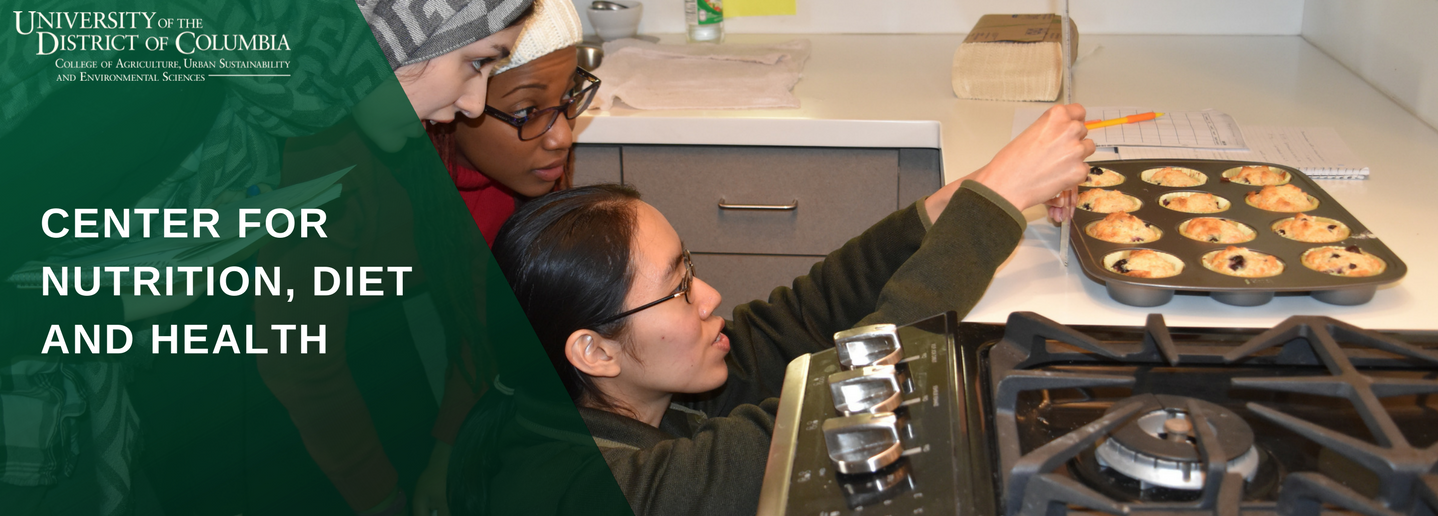The Center for Nutrition, Diet and Health
Mission & Overview
The Center for Nutrition, Diet, and Health (CNDH) offers high-quality, research-based community outreach programs that combat systemic urban nutrition and health issues. CNDH is dedicated to educating residents on the benefits of a healthy lifestyle and the prevention of obesity, heart disease, and other health threats. The program seeks to engage citizens in collaborative efforts to improve community health, obesity prevention, the quality of life, and economic opportunity for the District of Columbia, the nation, and the world
Goals
- Goal 1 (SNAP-Ed)
To provide sustainable educational programming that will help SNAP-eligible individuals to make healthy food choices within a limited budget. Additionally, individuals will be encouraged to choose physically active lifestyles consistent with the current dietary guidelines for Americans and the USDA food guidance system.
- Goal 2 (EFNEP)
To help disadvantaged youth and adults with young children to develop nutritionally sound diets and fitness habits, and to contribute to the total family diet and nutritional well-being through a sustainable community-based, relationship-driven, hands-on educational approach.
- Goal 3 (Food Safety and Food Security)
To provide educational programming that will provide knowledge and skills that can improve food safety and food security by increasing the availability of high-quality, nutritious, and safe food. In addition, individuals will receive training to become certified professional food managers.
- Goal 4 (Nutrition)
To work with key partners provide nutrition programs and conduct multidisciplinary research to optimize healthy eating habits that produce measurable improvements in health, obesity, food behavior, and physical activity-related outcomes
Community Education and Trainings
Supplemental Nutrition Assistance Program-Education (SNAP-Ed) provides education programs, behavior-change initiatives, and social marketing campaigns designed for individuals receiving or eligible for the Supplemental Nutrition Assistance Program (SNAP). SNAP-Ed programs and publications seek to increase healthy food and active lifestyle choices among District residents.
Expanded Food and Nutrition Education Program (EFNEP) provides nutrition education to low-income adults with young children and youth with emphasis on the following topics: nutritional needs and cultural heritage of audience; nutrition knowledge, skills, and attitudes; planning for daily food needs; food selection and preparation; food budgeting; local food resources; use and care of food preparation equipment; food safety; gardening and food production techniques; food preservation practices; maternal and infant nutrition; body weight; food intake; health and fitness; and referrals to other resources and assistance programs.
The District of Columbia Professional Food Managers/Food Handler Certification Program prepares food handlers for any of the accredited food managers’ examinations including ServSafe, Experior, and the National Registry of Food Safety Professionals exams. Topics include danger associated with food-borne illness, characteristics of potentially hazardous foods, employee health and personal hygiene, safe food handling, equipment, facilities, and Hazard Analysis Critical Control points (HACCP). Individuals successfully completing the course are eligible to take the national exam. To register, please visit here.
DC Water Blind Taste Testing Research Project is designed to determine consumer preferences and consumption patterns related to drinking water. Using a double-blind procedure and various types of drinking water, the project conducts tasting events throughout the city and collects data on water consumption behaviors.
Farmers Market Nutrition Education Program provides nutrition education at point-of-purchase for market-goers. The program also provides on-site food demonstrations using fresh produce from the market, nutrition education, recipes, and nutritional data for foods sold at markets.
Food Demonstrations and Cooking Classes provide interactive instruction on healthy cooking techniques and modified recipes that include healthier ingredients. Classes are open to the general public.
Food Safety Education trains food service workers in proper food handling procedures consistent with industry and regulatory standards. An interactive format provides practical, hands-on experience for students to learn best practices that prevent food-borne illness and reduce sanitary health threats.
Kids Cooking Classes provide children aged 2-5 years with hands-on cooking experiences. Demonstration foods include vegetables, fruits, whole grains, dairy, and protein. Research has shown that the more preschool-aged children are exposed to healthy foods, the more likely they will be to engage in healthier lifestyle choices later in life.
Nutrition, Diet, and Health Seminars are provided on a range of topics and can be tailored to specific audience types including healthy and age-appropriate eating. Our educators include Registered (RD) and Licensed (LD) Dietitians, and other food and nutrition experts.
Nutrition on Demand provides nutrition education upon the request of the community. Workshops and training sessions can be designed for any age group ranging from preschoolers to seniors and tailored to the health requirements of the requesting group. Using interactive cooking demonstrations, hands-on nutrition activities, grocery store tours, and seminars, Nutrition on Demand addresses several topics based on USDA recommendations.
Team Nutrition Project works to improve children’s lifelong eating and physical activity habits by providing training to child development centers and daycare food service professionals. Funded by the US Department of Agriculture (USDA), the training utilizes the curriculum developed for USDA’s MyPlate program and supports the Child and Adult Care Food Program (CACFP). The DC Team Nutrition Project Training Guide and other resources are provided to program participants.
Institute of Gerontology
The Institute of Gerontology (IOG) is housed within CNDH. The mission of IOG is to help preserve the independence of District of Columbia residents and to support low-income and disabled people 60 years old and above, with high-quality and compassionate volunteer service, through our Senior Companion and Respite Aide programs.
Health, wellness, and fitness for seniors 60 years old and above in the District of Columbia are provided by the Institute of Gerontology, through its Bodywise, Fitness, and Health program.
Higher education, tuition assistance, and intergenerational social engagement are provided by the Institute of Gerontology through its Senior Tuition program, for District of Columbia residents 65 years old and above.
For more information on IOG, click here.
Resources
Food and Nutrition Online Demonstrations
- Try Ramen Noodles: The Healthier Way – Download Now
- Water Recovery: Replenishing the Most Vital Nutrient Before And After – Watch Now
- Passcode Required: jHbVwvZ3
Institute of Gerontology (IOG) Brochure

